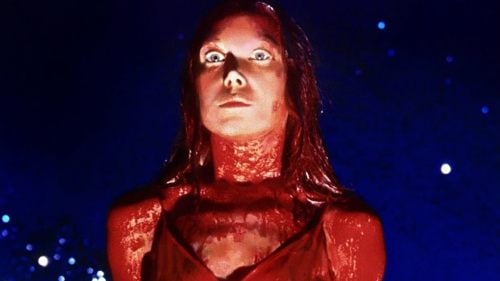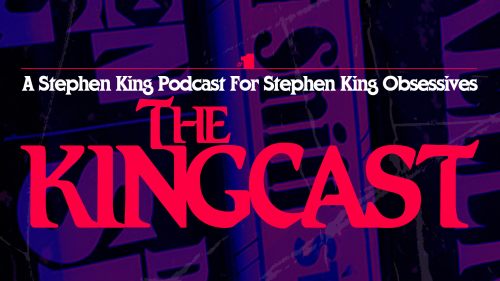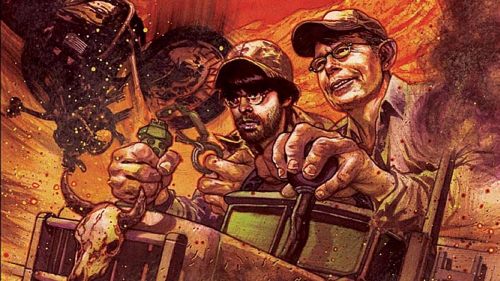BMD’s Favorite Stephen King Movies
We here at BMD love Stephen King. It’s no mystery. He’s the great unifier amongst the group. We even have a full King print issue of the mag coming soon to sit on your shelf. So, with the release of The Dark Tower (read Scott’s excellent review here), it only felt right that the staff get together and share their favorite memories of King Cinema.
Like his books, the movie versions of King’s works are like comfort food – a subgenre unto itself that crosses categorizations from straight horror (Pet Sematary) to weepie drama (The Shawshank Redemption) to TV Event (anybody remember Golden Years?). Despite sporting installments from renowned auteurs like Brian De Palma, John Carpenter and David Cronenberg, these movies still feel like they belong to the author above all else. That’s how strong his prose has been over the years, able to carry his trademark blue-collar aesthetics onto the silver screen, regardless of who was behind the camera. His stories are some of the greatest pulp yarns ever spun; four decades’ worth of material that’ve translated to the screen with varying results.
Without further ado, here are some of BMD’s favorite King Cinema entries…

The Mist [2007] (d. & w. Frank Darabont)
I have so much admiration for The Mist, a creature feature throwback that - unlike most any other Stephen King adaptation - actually manages to improve on its source material (King himself agrees!).Frank Darabont delivered a small, contained story with lovely practical effects and relentlessly escalating tension. The Mist is about interdimensional tentacle monsters, but like the best Stephen King stories, it's really about people, the wickedness and the heroism that are revealed in our darkest moments.
With Thomas Jane playing the perfect everyman, Andre Braugher as his nuanced foil, Marcia Gay Harden as the worst sort of evangelical low-life, and Toby Jones as an unexpected vanquisher of mist-beasts, the cast succeeds in enhancing an already great script. All this AND the best Dark Tower cross-over of all time in Drew Struzan's in-story movie poster? The only way The Mist could be better is if it offered a genuinely shocking ending, ruthless and nihilistic and as un-Hollywood as any mainstream movie we've ever seen. And it just so happens that it did. – Meredith

The Dead Zone [1983] (d. David Cronenberg, w. Jeffrey Boam)
When we think of the great Stephen King screen adaptations, there are certain titles that spring immediately to mind - The Shining, Misery, Stand By Me, Pet Sematary. But it always feels like people forget about David Cronenberg's The Dead Zone, and how truly outstanding it is. You've got Christopher Walken firing on all cylinders, a number of excellent flash-forward "psychic vision" set pieces (this movie guaranteed I will never, ever go ice skating on a frozen pond), and Martin Sheen turning in a truly loathsome performance as evil would-be President, Greg Stillson. Over three decades after its release, The Dead Zone has lost none of its punch...and in fact feels more timely than ever. I recommend revisiting this one the next time you're in the mood for some solid King-on-film, rather than re-watching The Shining for the 900th time. – Scott

1408 [2007] (d. Mikael Håfström, w. Matt Greenberg, Scott Alexander & Larry Karaszewski)
The adaptation of Stephen King’s 1408 is one of those films that did well both critically and at the box office, but few people talk about it a decade later. Despite the movie not coming up in conversation as often as some of the other adaptations of King’s work, John Cusack’s Mike and the deep weirdness of the story make the film a great watch. Under all the oddities of a story revolving around a murderous hotel room lies an important message that’s imparted by Mike before the film’s end, “bad memories are not to be forgotten, they are meant to be lived with.” Some folks might consider that a trite message, but I’m into it. – Amelia

Christine [1983] (d. John Carpenter, w. Bill Phillips)
Throughout his career, John Carpenter rarely took a job just for the paycheck, because his indifference usually showed in the final product. But one exception is 1983's Christine, which he says he took for the sake of his career after the failure of The Thing (he couldn't have possibly been a big fan of the novel, as it hadn't even been published when he took the gig). If he was just working as a "ho", as he's referred to it, he sure didn't let it show - at times it even elevates King's novel, primarily by dropping the somewhat silly possession plot in favor of something more simple and frightening: the car was simply born bad.
I saw it paired with Halloween at a revival a few years back and never realized the surface similarities until then - the movie's version of Christine, like the original (pre-Druid cult member) form of Michael Myers, was simply a force of evil - something that probably crossed Carpenter's mind when he decided to film it in the same neighborhood (Arnie's house is only a few blocks away from Laurie's). Carpenter also roped in his Escape From New York scene-stealer Harry Dean Stanton, who: A. should have been in more of his movies, and B. should have been in more Stephen King adaptations (his only other was Green Mile), as his trademark blue-collar weariness is right at home with any number of King characters. And while it's not exactly the showcase The Thing was, the SFX hold up beautifully, particularly the jaw-dropping hydraulics work that was employed when Christine "rebuilt" herself after getting destroyed by Buddy and his pals. In a perfect world, King and Carpenter would have collaborated a few times, as they share a number of sensibilities (distrust of authority, a love of both ancient evils and rock & roll) and appreciation for the genre that a number of their respective peers often dismiss. Christine is a pretty damn good movie even though they were allegedly shrugging it off - imagine what they could have done together if their hearts were in it? – Brian

Cujo [1983] (d. Lewis Teague, w. Don Carlos Dunaway & Lauren Currier)
Set alongside such auteur-driven efforts as Carrie, The Shining, Christine, and The Dead Zone, 1983’s Cujo is kind of unremarkable - and that’s what’s so perfect about it. Freed from the burden that comes with being a canvas for a name-above-the-title filmmaker, journeyman director Lewis Teague’s film manages to let King’s blue-collar, lived-in world of Castle Rock come to the forefront, and its tale of a rabid St. Bernard menacing a mother and child is presented (courtesy of cinematographer Jan De Bont) with just the right mix of suburban banality and spooky children’s nightmare. The result is, like King’s novel, a claustrophobic, unpleasant family drama whose second half takes place almost entirely inside a Ford Pinto. And it’s in that cramped space where Donna Trenton (Dee Wallace) must choose between facing down the titular mad dog waiting outside to tear her to pieces, and letting her son Tad (Danny Pintauro) die of dehydration. Lists of ‘80s horror heroines are rife with scream queens and final girls, but Dee Wallace as a flawed, frantic mother who’ll do anything to save her child is too often overlooked as a high point of women’s performances in horror. – Phil

Misery [1990] (d. Rob Reiner, w. William Goldman)
Stephen King writes about writers a lot. That's fair; after all, he probably understands the job better than many. Misery focuses on the unique pressure of obsessive and demanding fans - for King, inspired both by actual fans and his struggles with drugs and alcohol. Rob Reiner's film came at the tail end of a series of all-timers from the director, including fellow King adaptation Stand By Me, and rightfully earned Kathy Bates an Academy Award for her portrayal of psychotic, sledgehammer-wielding, author-kidnapping “number one fan” Annie Wilkes. Eschewing supernatural scares and even violence, mostly (outside the iconic hobbling scene), Misery gets its terrifying reputation entirely from Reiner's claustrophobic direction, Bates’ performance, and her character’s abusive relationship with James Caan’s romance novelist. And now that the internet has enabled hordes of angry fans to routinely and directly dogpile filmmakers, game developers, writers, and musicians for not creating exactly the work they want, Misery feels more relevant than ever. – Andrew

The Shining [1980] (d. Stanley Kubrick, w. Stanley Kubrick & Diane Johnson)
A horror film yet unrivaled in its use of space, The Shining is uniquely positioned amongst the entries in the King cinematic oeuvre. It's arguably the most deviant, even notoriously so, but its differing focus falls perfectly in line with the modus operandi of its director Stanley Kubrick. As we're lured deeper into the haunting heart of the Overlook, a maze-like hotel with hallways as vast as the surrounding sheet of winter, so, too, are we lured deeper into the madness of its caretaker Jack Torrance. Like his predecessors, Jack shoulders the ghastly weight of the hotel's past, a past his son Danny is mysteriously able to perceive, placing the little tyke and his soft-spoken mother in the path of Jack's violent derailment. The platonic ideal of "slow burn" horror, The Shining faces down every one of the genre's individual instincts and pivots towards a whole that trades in the immediately visceral for a pressure-cooked blood bath that seeps its way under your skin. – Siddhant

The Stand [1994] (d. Mick Garris, w. Stephen King)
Objectively, The Stand is not a great miniseries. It’s cheesy, most of the effects looked bad even when it first aired, and it has the same third act problems that plague the book.
And I sort of don’t care. I loved it as a kid, and I love it now. The cast alone is something of a miracle. From big parts to small, it has everyone from Gary Sinise to Molly Ringwald to Rob Lowe to Kathy Bates. It even has Dauber! On top of that, I believe Jamey Sheridan’s Randall Flagg, with his Baby Boomer rock n’ roll quotes, beer-swigging mullet and dumb Canadian Tuxedo, might be the most “Stephen King” character one of these adaptations has sported. Whether that’s a good or bad thing is up to you.
But I also admire how epic it feels. You really go on a journey with lots of shifts and changes. Four episodes, almost 400 minutes of storytelling, and yet it never feels boring or arbitrarily stretched out to fill a running time. Watching it as it aired back in 1994 was a true television event. Watching it now at one’s own pace, the story - even with its many faults - still grips, particularly its two opening episodes. Say what you want, but it’s a cohesive adaptation. Even the score feels iconic. – Evan

The Lawnmower Man [1992] (d. Brett Leonard, w. Brett Leonard & Gimel Everett)
This entry is sort of a cheat, as it’s really not a King adaptation (the author actually sued to have his name removed from the picture), and it’s definitely not my favorite entry into the King Cinema Canon. Yet Brett Leonard’s ’92 techsploitation freak out is too bizarre and fascinating to deny, operating more like William Gibson fan fiction under a King moniker. It’s Power Gloves For Algernon, as Jeff Fahey’s simple groundskeeper Jobe is transformed into a literal Cyber God thanks to an overzealous scientist’s (pre-Bond Pierce Brosnan) research into the realms of virtual reality. This is the type of movie where a brainwashed monkey wearing a mini-RoboCop outfit gets into a Mexican stand-off with a legion of law enforcement officials within the first twenty minutes, all while Fahey screams “Cyboman!” as the simian’s cut down in a hail of gunfire. It’s that fucking weird.
However, this commitment to oddity is also what marks The Lawnmower Man as being so damn special. There are numerous nods for King nuts (as the nefarious Shop – the author’s omnipresent CIA stand-in – fund the experiments), and Leonard’s jaunt into a pixelated psychosphere actually mirrors the interrogations of spiritual overreach and oppression that dominated De Palma’s Carrie (which is probably this author’s actual favorite King adaptation). By the time Jobe is both fucking and duking it out inside cyberspace, Leonard’s Sirkian take on '90s suburban melodrama gives way to a hallucinatory cinematic experience that predates The Matrix – technology breathing new life into one man’s damaged brain and allowing him to create his own reality. Often dismissed by many as being simply another bullshit entry into the early half of the decade’s obsession with computer-based terror (Ghost in the Machine anyone?), The Lawnmower Man is a legitimately bizarre and heady curio, especially in its 140-minute Director’s Cut form. - Jacob



